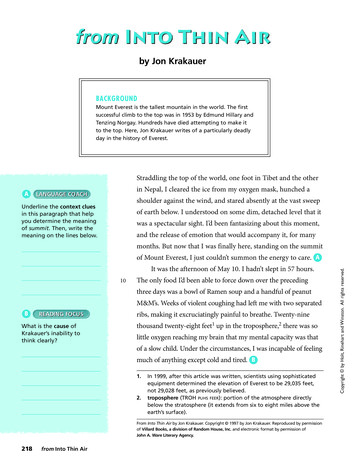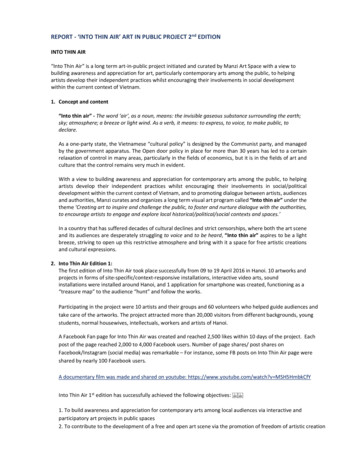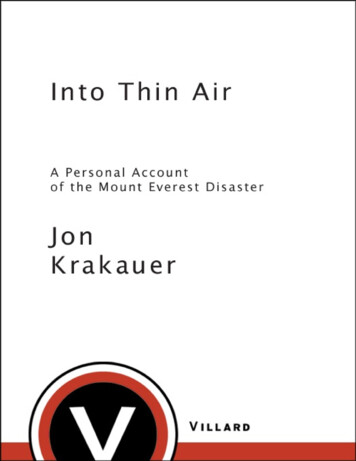
Transcription
from Into Thin Airby Jon KrakauerBACKGROUNDMount Everest is the tallest mountain in the world. The firstsuccessful climb to the top was in 1953 by Edmund Hillary andTenzing Norgay. Hundreds have died attempting to make itto the top. Here, Jon Krakauer writes of a particularly deadlyday in the history of Everest.Straddling the top of the world, one foot in Tibet and the otherAin Nepal, I cleared the ice from my oxygen mask, hunched aLANGUAGE COACHshoulder against the wind, and stared absently at the vast sweepUnderline the context cluesin this paragraph that helpyou determine the meaningof summit. Then, write themeaning on the lines below.of earth below. I understood on some dim, detached level that itwas a spectacular sight. I’d been fantasizing about this moment,and the release of emotion that would accompany it, for manymonths. But now that I was finally here, standing on the summitIt was the afternoon of May 10. I hadn’t slept in 57 hours.10The only food I’d been able to force down over the precedingthree days was a bowl of Ramen soup and a handful of peanutM&M’s. Weeks of violent coughing had left me with two separatedBREADING FOCUSWhat is the cause ofKrakauer’s inability tothink clearly?ribs, making it excruciatingly painful to breathe. Twenty-ninethousand twenty-eight feet1 up in the troposphere,2 there was solittle oxygen reaching my brain that my mental capacity was thatof a slow child. Under the circumstances, I was incapable of feelingmuch of anything except cold and tired. B1.2.In 1999, after this article was written, scientists using sophisticatedequipment determined the elevation of Everest to be 29,035 feet,not 29,028 feet, as previously believed.troposphere (TROH PUHS FEER): portion of the atmosphere directlybelow the stratosphere (it extends from six to eight miles above theearth’s surface).From Into Thin Air by Jon Krakauer. Copyright 1997 by Jon Krakauer. Reproduced by permissionof Villard Books, a division of Random House, Inc. and electronic format by permission ofJohn A. Ware Literary Agency.218from Into Thin AirCopyright by Holt, Rinehart and Winston. All rights reserved.of Mount Everest, I just couldn’t summon the energy to care. A
CLITERARY ANALYSISWhy might Krakauer beworried about approachingclouds?This image cannot be included in this publication becausethe copyright holder has denied permission and/or haselectronic use conditions with which we cannot comply. Scott Fischer/Woodfin Camp and AssociatesI’d arrived on the summit a few minutes after AnatoliBoukreev,3 a Russian guide with an American expedition, and20just ahead of Andy Harris, a guide with the New Zealand–basedcommercial team that I was a part of and someone with whomI’d grown to be friends during the last six weeks. I snapped fourquick photos of Harris and Boukreev striking summit poses, andthen turned and started down. My watch read 1:17 p.m. All told,Copyright by Holt, Rinehart and Winston. All rights reserved.I’d spent less than five minutes on the roof of the world.After a few steps, I paused to take another photo, this onelooking down the Southeast Ridge, the route we had ascended.Training my lens on a pair of climbers approaching the summit,I saw something that until that moment had escaped my30attention. To the south, where the sky had been perfectly clearjust an hour earlier, a blanket of clouds now hid Pumori, AmaDablam, and the other lesser peaks surrounding Everest. CDays later—after six bodies had been found, after asearch for two others had been abandoned, after surgeons hadamputated4 the gangrenous5 right hand of my teammate Beck3.4.5.Anatoli Boukreev: Boukreev was killed in an avalanche about a yearand a half later, on December 25, 1997, while climbing Annapurna inthe Himalayas.amputated: surgically removed, usually a limb or another body part.gangrenous (GANG GRUH NUHS): affected by the decay of tissueresulting from a lack of blood supply.from Into Thin Air219
Weathers—people would ask why, if the weather had begun toLITERARY FOCUSdeteriorate, had climbers on the upper mountain not heeded theWhat is the mood at thebeginning of this paragraph?Describe how the moodchanges throughout theparagraph.signs? Why did veteran Himalayan guides keep moving upward,Aleading a gaggle of amateurs, each of whom had paid as much40as 65,000 to be ushered safely up Everest, into an apparentdeath trap?Nobody can speak for the leaders of the two guidedgroups involved, for both men are now dead. But I can attestthat nothing I saw early on the afternoon of May 10 suggestedthat a murderous storm was about to bear down on us. Tomy oxygen-depleted mind, the clouds drifting up the grandvalley of ice known as the Western Cwm looked innocuous,wispy, insubstantial. Gleaming in the brilliant midday sun, theyappeared no different from the harmless puffs of convection50condensation that rose from the valley almost daily. As I beganmy descent, I was indeed anxious, but my concern had little todo with the weather. A check of the gauge on my oxygen tankhad revealed that it was almost empty. I needed to get down,LITERARY FOCUSfast. AThe uppermost shank of the Southeast Ridge is a slender,Look at the sentence structurein this paragraph. Count thenumber of words in eachsentence. Why do you thinkthe author chose sentences ofthis length?heavily corniced fin6 of rock and wind-scoured snow that snakesfor a quarter-mile toward a secondary pinnacle known as theSouth Summit. Negotiating the serrated7 ridge presents few greattechnical hurdles, but the route is dreadfully exposed. After 1560minutes of cautious shuffling over a 7,000-foot abyss,8 I arrivedat the notorious Hillary Step, a pronounced notch in the ridgenamed after Sir Edmund Hillary, the first Westerner to climb themountain, and a spot that does require a fair amount of technicalmaneuvering. As I clipped into a fixed rope and prepared torappel9 over the lip, I was greeted by an alarming sight. B6.7.8.9.220from Into Thin Aircorniced (KAWR NIHST) fin: ridge with an overhanging mass of snowor ice deposited by the wind.serrated: notched like a saw.abyss (UH BIHS): deep crack or opening in the earth’s surface.rappel (RA PEHL): descend a mountain by means of a double ropearranged around the climber’s body so that he or she can control theslide downward.Copyright by Holt, Rinehart and Winston. All rights reserved.B
Thirty feet below, some 20 people were queued up10 at thebase of the Step, and three climbers were hauling themselves upthe rope that I was attempting to descend. I had no choice but tounclip from the line and step aside.70CLANGUAGE COACHBased on the context clues inthis paragraph, what do youthink throng means?The traffic jam comprised climbers from three separateexpeditions: the team I belonged to, a group of paying clientsunder the leadership of the celebrated New Zealand guide RobHall; another guided party headed by American Scott Fischer;and a nonguided team from Taiwan. Moving at the snail’s pacethat is the norm above 8,000 meters, the throng labored up theHillary Step one by one, while I nervously bided my time. CHarris, who left the summit shortly after I did, soon pulledup behind me. Wanting to conserve whatever oxygen remainedDREADING FOCUSWhat was the effect ofHarris’s error?in my tank, I asked him to reach inside my backpack and turn off80the valve on my regulator, which he did. For the next ten minutesI felt surprisingly good. My head cleared. I actually seemed lesstired than with the gas turned on. Then, abruptly, I felt like I wassuffocating. My vision dimmed and my head began to spin. I wason the brink of losing consciousness.Instead of turning my oxygen off, Harris, in his hypoxi-Copyright by Holt, Rinehart and Winston. All rights reserved.cally11 impaired state, had mistakenly cranked the valve opento full flow, draining the tank. I’d just squandered the last of mygas going nowhere. D There was another tank waiting for me atthe South Summit, 250 feet below, but to get there I would have90to descend the most exposed terrain on the entire route withoutbenefit of supplemental oxygen.But first I had to wait for the crowd to thin. I removed mynow useless mask, planted my ice ax into the mountain’s frozenhide, and hunkered on the ridge crest. As I exchanged banal12congratulations with the climbers filing past, inwardly I wasfrantic: “Hurry it up, hurry it up!” I silently pleaded. “While you10. queued (KYOOD) up: lined up.11. hypoxically: characterized by hypoxia, a condition resulting from adecrease in the oxygen reaching body tissues. Hypoxia is a commoncondition at very high altitudes.12. banal (BUH NAL): everyday; commonplace.from Into Thin Air221
guys are messing around here, I’m losing brain cells byAthe millions!”VOCABULARYMost of the passing crowd belonged to Fischer’s group, butWord StudyThe adjective reserved hasmore than one meaning.What is the meaning ofreserved as it used here?What is another meaning ofreserved?100near the back of the parade two of my teammates eventuallyappeared: Hall and Yasuko Namba. Girlish and reserved, the47-year-old Namba was 40 minutes away from becoming theoldest woman to climb Everest and the second Japanese womanto reach the highest point on each continent, the so-called SevenSummits. ALater still, Doug Hansen—another member of our expedition,a postal worker from Seattle who had become my closest friendon the mountain—arrived atop the Step. “It’s in the bag!” I yelledover the wind, trying to sound more upbeat than I felt. Plainly110exhausted, Doug mumbled something from behind his oxygenmask that I didn’t catch, shook my hand weakly, and continuedplodding upward.VOCABULARYThe last climber up the rope was Fischer, whom I knewSelection Vocabularycasually from Seattle, where we both lived. His strength and driveKrakauer notices that theweather no longer looksbenign. Write an antonym ofbenign that describes whatthe weather might look like.Recall that an antonym is aword that means the opposite of another word.were legendary—in 1994 he’d climbed Everest without usingbottled oxygen—so I was surprised at how slowly he was movingand how hammered he looked when he pulled his mask aside tosay hello. “Bruuuuuuce!” he wheezed with forced cheer, employinghis trademark, fratboyish greeting. When I asked how he was120doing, Fischer insisted he was feeling fine: “Just dragging a littletoday for some reason. No big deal.” With the Hillary Step finallyclear, I clipped into the strand of orange rope, swung quicklyaround Fischer as he slumped over his ice ax, and rappelled overthe edge.It was after 2:30 when I made it down to the South Summit.By now tendrils of mist were wrapping across the top of 27,890foot Lhotse and lapping at Everest’s summit pyramid. No longerdid the weather look so benign. B I grabbed a fresh oxygencylinder, jammed it onto my regulator, and hurried down into130the gathering cloud.Four hundred vertical feet above, where the summit was stillwashed in bright sunlight under an immaculate cobalt sky, my222from Into Thin AirCopyright by Holt, Rinehart and Winston. All rights reserved.B
compadres13 were dallying,14 memorializing their arrival at theapex of the planet with photos and high-fives—and using up precious ticks of the clock. None of them imagined that a horribleordeal was drawing nigh. None of them suspected that by the endof that long day, every minute would matter. . . . CAt 3 p.m., within minutes of leaving the South Summit, Idescended into clouds ahead of the others. Snow started to fall.140In the flat, diminishing light, it became hard to tell where themountain ended and where the sky began. It would have beenCLITERARY FOCUSUnderline the sentences inthis paragraph in which themood is joyous. Circle thesentences in which the moodis dark and threatening.DQUICK CHECKWhy was Weathers “nearlyblind”?very easy to blunder off the edge of the ridge and never be heardfrom again. The lower I went, the worse the weather became.When I reached the Balcony again, about 4 p.m., I encountered Beck Weathers standing alone, shivering violently. Yearsearlier, Weathers had undergone radial keratotomy to correct hisvision. A side effect, which he discovered on Everest andconsequently hid from Hall, was that in the low barometricpressure at high altitude, his eyesight failed. Nearly blind when150he’d left Camp Four in the middle of the night but hopeful thathis vision would improve at daybreak, he stuck close to theperson in front of him and kept climbing. DCopyright by Holt, Rinehart and Winston. All rights reserved.Upon reaching the Southeast Ridge shortly after sunrise,Weathers had confessed to Hall that he was having troubleELITERARY ANALYSISWhat might have happenedif Weathers were to haveclimbed down the mountainby himself?seeing, at which point Hall declared, “Sorry, pal, you’re goingdown. I’ll send one of the Sherpas15 with you.” Weatherscountered that his vision was likely to improve as soon as the suncrept higher in the sky; Hall said he’d give Weathers 30 minutesto find out—after that, he’d have to wait there at 27,500 feet for160Hall and the rest of the group to come back down. Hall didn’twant Weathers descending alone. E “I’m dead serious aboutthis,” Hall admonished his client. “Promise me that you’ll sit righthere until I return.”13. compadres (KUHM PAH DRAYZ): close friends; in this case, fellowmembers of the climbing team.14. dallying: wasting time.15. Sherpas: members of a Tibetan people living on the southern slopesof the Himalayas. As experienced mountain climbers, Sherpas areoften hired to assist or act as guides for mountaineering.from Into Thin Air223
“I crossed my heart and hoped to die,” Weathers recallsAnow, “and promised I wouldn’t go anywhere.” Shortly after noon,VOCABULARYHutchison, Taske, and Kasischke16 passed by with their SherpaSelection Vocabularyescorts, but Weathers elected not to accompany them. “TheUnderline the phrases andsentences in this paragraphthat show that the weatherhas deteriorated, or gottenworse.weather was still good,” he explains, “and I saw no reason tobreak my promise to Rob.”170BBy the time I encountered Weathers, however, conditionswere turning ugly. “Come down with me,” I implored, “I’ll getLANGUAGE COACHyou down, no problem.” He was nearly convinced, until I madeBased on the context cluesin this paragraph, what doyou think is the meaning ofappalling?the mistake of mentioning that Groom was on his way down,too. In a day of many mistakes, this would turn out to be a crucial one. “Thanks anyway,” Weathers said. “I’ll just wait for Mike.He’s got a rope; he’ll be able to short-rope17 me.” Secretly relieved,I hurried toward the South Col, 1,500 feet below.These lower slopes proved to be the most difficult part ofthe descent. Six inches of powder snow blanketed outcroppings180of loose shale. Climbing down them demanded unceasingconcentration, an all but impossible feat in my current state. By5:30, however, I was finally within 200 vertical feet of Camp Four,and only one obstacle stood between me and safety: a steep bulgeweather had deteriorated into a full-scale blizzard. Snow pelletsborn on 70-mph winds stung my face; any exposed skin wasinstantly frozen. The tents, no more than 200 horizontal yardsaway, were only intermittently visible through the whiteout. AThere was zero margin for error. Worried about making a critical190blunder, I sat down to marshal my energy.Suddenly, Harris appeared out of the gloom and sat besideme.18 At this point there was no mistaking that he was in appallingshape. B His cheeks were coated with an armor of frost, one eyewas frozen shut, and his speech was slurred. He was frantic to16. Stuart Hutchison, Dr. John Taske, and Lou Kasischke were threeclients on Rob Hall’s team.17. short-rope: assist a weak or injured climber by hauling him or her.18. After writing this article, Krakauer discovered through conversationswith Martin Adams (a client on Scott Fischer’s team) that the personhe thought was Harris was, in fact, Martin Adams.224from Into Thin AirCopyright by Holt, Rinehart and Winston. All rights reserved.of rock-hard ice that I’d have to descend without a rope. But the
reach the tents. After briefly discussing the best way to negotiatethe ice, Harris started scooting down on his butt, facing forward.“Andy,” I yelled after him, “it’s crazy to try it like that!” He yelledsomething back, but the words were carried off by the screamingwind. A second later he lost his purchase19 and was rocketing200down on his back.CLITERARY FOCUSDescribe the sentencestructure in this paragraph.Why do you think the authorchooses to use this structurehere?Two hundred feet below, I could make out Harris’smotionless form. I was sure he’d broken at least a leg, maybe hisneck. But then he stood up, waved that he was OK, and startedstumbling toward camp, which was for the moment in plain sight,150 yards beyond.I could see three or four people shining lights outside thetents. I watched Harris walk across the flats to the edge of camp,a distance he covered in less than ten minutes. When the cloudsclosed in a moment later, cutting off my view, he was within21030 yards of the tents. I didn’t see him again after that, but I wascertain that he’d reached the security of camp, where Sherpaswould be waiting with hot tea. Sitting out in the storm, with theice bulge still standing between me and the tents, I felt a pang ofenvy. I was angry that my guide hadn’t waited for me.Copyright by Holt, Rinehart and Winston. All rights reserved.Twenty minutes later I was in camp. I fell into my tent withmy crampons still on, zipped the door tight, and sprawled acrossthe frost-covered floor. I was drained, more exhausted than I’dever been in my life. But I was safe. Andy was safe. The otherswould be coming into camp soon. We’d done it. We’d climbed220Mount Everest. CIt would be many hours before I learned that everyone hadin fact not made it back to camp—that one teammate was alreadydead and that 23 other men and women were caught in adesperate struggle for their lives. . . .Meanwhile, Hall and Hansen were still on the frightfullyexposed summit ridge, engaged in a grim struggle of their own.The 46-year-old Hansen, whom Hall had turned back just belowthis spot exactly a year ago, had been determined to bag the19. purchase: firm hold.from Into Thin Air225
summit this time around. “I want to get this thing done and outAREADING FOCUS230of my life,” he’d told me a couple of days earlier. “I don’t want tohave to come back here.”What do you think causessomeone to continue toclimb even if he or she is inlife-threatening danger?Indeed Hansen had reached the top this time, though notuntil after 3 p.m., well after Hall’s predetermined turnaroundtime. Given Hall’s conservative, systematic nature, many peoplewonder why he didn’t turn Hansen around when it becameobvious that he was running late. It’s not far-fetched to speculatethat because Hall had talked Hansen into coming back toEverest this year, it would have been especially hard for him todeny Hansen the summit a second time—especially when all of240Fischer’s clients were still marching blithely toward the top.“It’s very difficult to turn someone around high on themountain,” cautions Guy Cotter, a New Zealand guide whosummited Everest with Hall in 1992 and was guiding the peak forhim in 1995 when Hansen made his first attempt. “If a client seesthat the summit is close and they’re dead set on getting there,they’re going to laugh in your face and keep going up.” AIn any case, for whatever reason, Hall did not turn Hansenaround. Instead, after reaching the summit at 2:10 p.m., Hall250headed down with him. Soon after they began their descent,just below the top, Hansen apparently ran out of oxygen andcollapsed. “Pretty much the same thing happened to Doug in’95,” says Ed Viesturs, an American who guided the peak forHall that year. “He was fine during the ascent, but as soon as hestarted down he lost it mentally and physically. He turned intoa real zombie, like he’d used everything up.”At 4:31 p.m., Hall radioed Base Camp to say that he andHansen were above the Hillary Step and urgently needed oxygen.Two full bottles were waiting for them at the South Summit; if260Hall had known this he could have retrieved the gas fairly quicklyand then climbed back up to give Hansen a fresh tank. ButHarris, in the throes of his oxygen-starved dementia,20 overheard20. dementia (DIH MEHN226from Into Thin AirSHUH):mental impairment.Copyright by Holt, Rinehart and Winston. All rights reserved.waited for more than an hour for Hansen to arrive and then
the 4:31 radio call while descending the Southeast Ridge andbroke in to tell Hall that all the bottles at the South Summit wereempty. So Hall stayed with Hansen and tried to bring the helplessclient down without oxygen, but could get him no farther thanBREADING FOCUSWhat causes Hall to notretrieve the full oxygentanks?the top of the Hillary Step. BCotter, a very close friend of both Hall and Harris, happenedto be a few miles from Everest Base Camp at the time, guiding270an expedition on Pumori. Overhearing the radio conversationsbetween Hall and Base Camp, he called Hall at 5:36 and againat 5:57, urging his mate to leave Hansen and come down alone. . . .Hall, however, wouldn’t consider going down without Hansen.There was no further word from Hall until the middle ofthe night. At 2:46 a.m. on May 11, Cotter woke up to hear a long,broken transmission, probably unintended: Hall was wearing aCLANGUAGE COACHBased on the context cluesin this sentence, what doesunintended mean?remote microphone clipped to the shoulder strap of his backpack,which was occasionally keyed on by mistake. C In this instance,says Cotter, “I suspect Rob didn’t even know he was transmitting. I280could hear someone yelling—it might have been Rob, but I couldn’tbe sure because the wind was so loud in the background. He wassaying something like ‘Keep moving! Keep going!’ presumably toCopyright by Holt, Rinehart and Winston. All rights reserved.Doug, urging him on.”If that was indeed the case, it meant that in the wee hoursof the morning Hall and Hansen were still struggling from theHillary Step toward the South Summit, taking more than 12hours to traverse a stretch of ridge typically covered by descendingclimbers in half an hour.Hall’s next call to Base Camp was at 4:43 a.m. He’d finally290reached the South Summit but was unable to descend farther,and in a series of transmissions over the next two hours hesounded confused and irrational. “Harold21 was with me lastnight,” Hall insisted, when in fact Harris had reached the SouthCol at sunset. “But he doesn’t seem to be with me now. He wasvery weak.”21. Harold: Andy Harris’s nickname.from Into Thin Air227
Mackenzie22 asked him how Hansen was doing. “Doug,”AHall replied, “is gone.” That was all he said, and it was the lastQUICK CHECKmention he ever made of Hansen.What does Krakauer thinkhappened to Hansen?On May 23, when Breashears and Viesturs, of the IMAX300team,23 reached the summit, they found no sign of Hansen’sbody but they did find an ice ax planted about 50 feet below theHillary Step, along a highly exposed section of ridge where thefixed ropes came to an end. It is quite possible that Hall managedto get Hansen down the ropes to this point, only to have himlose his footing and fall 7,000 feet down the sheer SouthwestFace, leaving his ice ax jammed into the ridge crest where heslipped. ABDuring the radio calls to Base Camp early on May 11, HallVOCABULARYrevealed that something was wrong with his legs, that he was noWord StudyThe noun gravity has morethan one meaning. What isthe meaning used here? Usea dictionary if you need help.310longer able to walk and was shaking uncontrollably. This wasvery disturbing news to the people down below, but it wasamazing that Hall was even alive after spending a night withoutshelter or oxygen at 28,700 feet in hurricane-force wind andminus-100-degree windchill.At 5 a.m., Base Camp patched through a call on thepregnant with their first child in Christchurch, New Zealand.Arnold, a respected physician, had summited Everest with Hallin 1993 and entertained no illusions about the gravity of her320husband’s predicament. B “My heart really sank when I heardhis voice,” she recalls. “He was slurring his words markedly. Hesounded like Major Tom24 or something, like he was just floatingaway. I’d been up there; I knew what it could be like in badweather. Rob and I had talked about the impossibility of being22. Mackenzie: Dr. Caroline Mackenzie was Base Camp doctor for RobHall’s team.23. IMAX team: another team of climbers, who were shooting a 5.5-million giant-screen movie about Mount Everest. The movie wasreleased in 1998.24. Major Tom: reference to the David Bowie song “Space Oddity,”which is about an astronaut, Major Tom, who is lost in space.228from Into Thin AirCopyright by Holt, Rinehart and Winston. All rights reserved.satellite telephone to Jan Arnold, Hall’s wife, seven months
rescued from the summit ridge. As he himself had put it, ‘Youmight as well be on the moon.’”By that time, Hall had located two full oxygen bottles, andafter struggling for four hours trying to de-ice his mask, aroundCREADING FOCUSWhat caused Hall to beunable to descend on hisown?8:30 a.m. he finally started breathing the life-sustaining gas.330Several times he announced that he was preparing to descend,only to change his mind and remain at the South Summit. Theday had started out sunny and clear, but the wind remainedfierce, and by late morning the upper mountain was wrappedwith thick clouds. Climbers at Camp Two reported that the windover the summit sounded like a squadron of 747s, even from8,000 feet below. . . .Throughout that day, Hall’s friends begged him to make aneffort to descend from the South Summit under his own power.At 3:20 p.m., after one such transmission from Cotter, Hall began340to sound annoyed. “Look,” he said, “if I thought I could managethe knots on the fixed ropes with me frostbitten hands, I wouldhave gone down six hours ago, pal. Just send a couple of the boysup with a big thermos of something hot—then I’ll be fine.” CDLITERARY FOCUSDescribe the mood of thestory during the conversationbetween Hall and his wife.At 6:20 p.m., Hall was patched through a second time toCopyright by Holt, Rinehart and Winston. All rights reserved.Arnold in Christchurch. “Hi, my sweetheart,” he said in a slow,painfully distorted voice. “I hope you’re tucked up in a nice warmbed. How are you doing?”“I can’t tell you how much I’m thinking about you!” Arnoldreplied. “You sound so much better than I expected. . . . Are you350warm, my darling?”“In the context of the altitude, the setting, I’m reasonablycomfortable,” Hall answered, doing his best not to alarm her.“How are your feet?”“I haven’t taken me boots off to check, but I think I mayhave a bit of frostbite.”“I’m looking forward to making you completely better whenyou come home,” said Arnold. “I just know you’re going to berescued. Don’t feel that you’re alone. I’m sending all my positiveenergy your way!” Before signing off, Hall told his wife, “I love360you. Sleep well, my sweetheart. Please don’t worry too much.” Dfrom Into Thin Air229
These would be the last words anyone would hear him utter.AAttempts to make radio contact with Hall later that night and theVOCABULARYWord Studynext day went unanswered. Twelve days later, when BreashearsWhich word in this sentenceis a synonym for carapace,which appears in line 380?and Viesturs climbed over the South Summit on their way tothe top, they found Hall lying on his right side in a shallow icehollow, his upper body buried beneath a drift of snow.Early on the morning of May 11, when I returned to CampBFour, Hutchison, standing in for Groom, who was unconsciousLITERARY FOCUSWhat mood does Hutchison’sdescriptions of Namba andWeathers create?in his tent, organized a team of four Sherpas to locate the bodies370of our teammates Weathers and Namba. The Sherpa search party,headed by Lhakpa Chhiri, departed ahead of Hutchison, whowas so exhausted and befuddled that he forgot to put his bootson and left camp in his light, smooth-soled liners. Only whenLhakpa Chhiri pointed out the blunder did Hutchison returnfor his boots. Following Boukreev’s directions, the Sherpas hadno trouble locating the two bodies at the edge of the KangshungFace.The first body turned out to be Namba, but Hutchisoncouldn’t tell who it was until he knelt in the howling wind and380chipped a three-inch-thick carapace of ice from her face. To hiswere gone, and her bare hands appeared to be frozen solid. Hereyes were dilated.25 The skin on her face was the color of porcelain.“It was terrible,” Hutchison recalls. “I was overwhelmed. She wasvery near death. I didn’t know what to do.”He turned his attention to Weathers, who lay 20 feet away.His face was also caked with a thick armor of frost. A Ballsof ice the size of grapes were matted to his hair and eyelids.After cleaning the frozen detritus26 from his face, Hutchison390discovered that he, too, was still alive: “Beck was mumblingsomething, I think, but I couldn’t tell what he was trying to say.His right glove was missing and he had terrible frostbite. He wasas close to death as a person can be and still be breathing.” B25. dilated: made wider; here, referring to the pupil of the eye.26. detritus (DEE TRYT UHS): debris.230from Into Thin AirCopyright by Holt, Rinehart and Winston. All rights reserved.shock, he discovered that she was still breathing. Both her gloves
Badly shaken, Hutchison went over to the Sherpas andasked Lhakpa Chhiri’s advice. Lhakpa Chhiri, an Everest veteranrespected by Sherpas and sahibs27 alike for his mountain savvy,urged Hutchison to leave Weathers and Namba where they lay.CQUICK CHECKWhat had been the last weknew of Weathers?Even if they survived long enough to be dragged back to CampFour, they would certainly die before
218 from Into Thin Air from Into Thin Air by Jon Krakauer BACKGROUND Mount Everest is the tallest mountain in the world. The first successful climb to the top was in 1953 by Edmund Hillary and Tenzing Norgay. Hundreds have died attempting to make it to the top. Here, Jon Krakauer writes of a particularly deadly day in the history of Everest.










